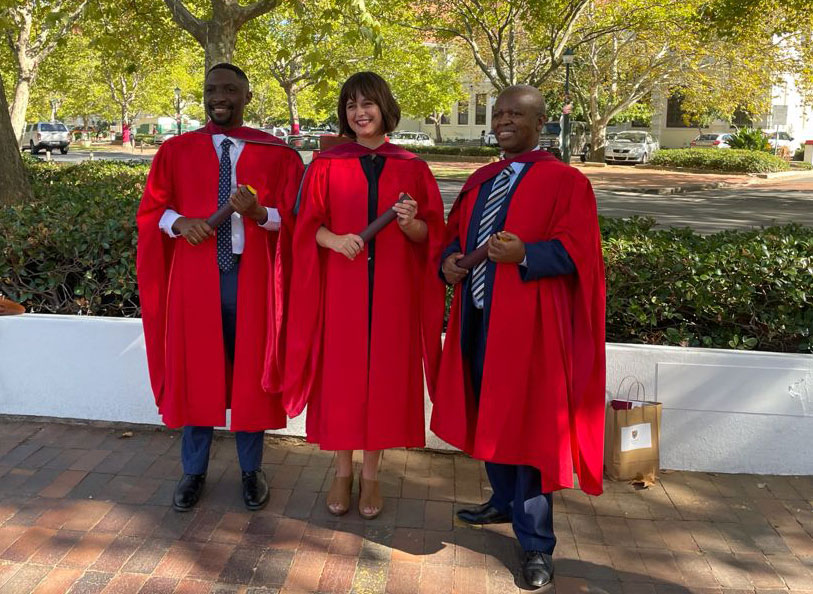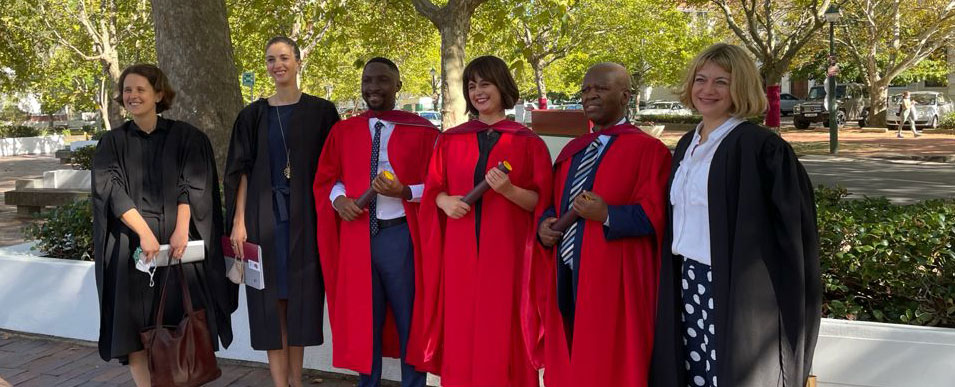Three RESEP doctoral candidates were capped at a recent Stellenbosch University (SU) Faculty of Economic and Management Sciences graduation ceremony for PhDs. Congratulations to Joel Gondwe, Dumisani Hompashe and Heleen Hofmeyr (pictured below). Also in attendance were some of the candidates’ supervisors, Gabrielle Wills and Anja Smith. Ronelle Burger additionally supervised a successful candidate not involved with RESEP.

This is just the latest in a long line of successful PhD candidates that have passed through RESEP’s doors—Servaas van der Berg has personally supervised or co-supervised 27 PhDs in the past decade. At present, there are 22 PhDs enrolled, of which more than 70% are women. Five of these candidates are from other African countries, whilst the remaining 17 are South African, including seven black African, seven white and three from other South African population groups.
These growing numbers of PhDs contribute significantly to RESEP’s aim of expanding capacity in socio-economic research. Diversity is achieved through attracting students interested in these matters, some of whom are former postgraduate students in Economics at Stellenbosch University.
RESEP PhD candidates must possess a good technical skills base, be committed to working on social and economic policy issues that have a bearing on poverty and inequality, and have an interest in doing research that informs policy. Working in a team of about 50 researchers and PhDs on related issues, and often on related data sets, is especially beneficial to students undertaking a PhD at RESEP. Much of the learning takes place in this context of shared experience and proximity to expert mentors and collaborators. Students are encouraged to select topics that are related to the work RESEP is currently undertaking, thereby maximising information flows and learning across the wider team.
Many RESEP PhD graduates and researchers end up doing research on related issues, such as Dr Carlos da Maia at the World Bank in Mozambique, Ms Bongisa Lekezwa at the World Bank office in Pretoria, Ms Megan Sager who founded Consulting for Sustainable Solutions (a consulting firm specialising in housing issues), and Mr Doubell Chamberlain, founder and managing director of CENFRI (an international consulting firm on development finance issues). Some even end up as professors at other universities, such as Prof Derek Yu, chair of the Economics Department at the University of the Western Cape, Prof Haroon Bhorat, Director of Cape Town University’s DPRU, and Prof Frikkie Booysen at the University of the Witswatersrand.
Bursaries from the Graduate School of Economic and Management Sciences (GEMS) at SU has been more than helpful, in particular for funding the PhD studies of students from other African countries. Two post-doctoral positions funded by the NRF were introduced in 2021, of which Dr Joel Gondwe and Dr Heleen Hofmeyr are the new incumbents. Some of RESEP’s consulting work additionally generates resources for PhD students. Despite this, funding is increasingly the bottleneck, especially as resources from the NRF, a historically large contributor, is now drying up.





